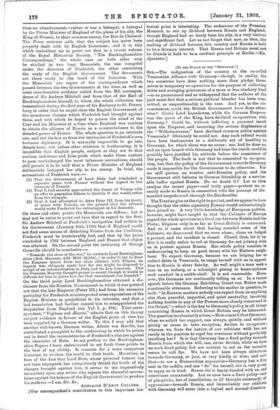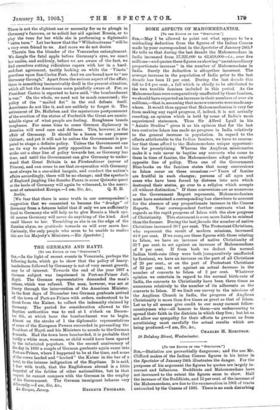[To THE EDITOR OP TEE " SPECTATOR:1 Sin,—The indignation of
the country at the so-called Venezuelan Alliance with Germany—though, in reality, the two countries have done nothing more than pledge them- selves to temporary co-operation for the purpose of collecting debts and avenging grievances of a more or less shadowy kind —is so pronounced and so widespread that the authors of the pact must feel that a serious political blunder has been corn. mitted, as unquestionably is the case. And yet, in the cir- cumstances, could the British Government have done other- wise ? Could Lord Lansdowne, while the German Emperor was the guest of the King, have declined co-operation with Germany ? Could he, without inflicting a personal insult
upon the Emperor, and incurring the serious displeasure of the " Wilhelmstrasse," have declined common action against Venezuela? Obviously he could not. Any such refusal would have been tantamount to a deliberate act of hostility to Germany, for which there was no cause ; nor, had he done so, and an open breach with Germany had been the result, could he possibly have justified his attitude before the conscience of the people. The fault is not that he consented to co-opera- tion, but that the policy of the Government towards Germany made it impossible for the Government to do otherwise. For we still pursue an evasive, anti-Russian policy, and the Government still believes in German friendship as a service- able buffer against Russia. Do we doubt it? Let us then analyse the recent paper—and truly paper—protest we re- cently made to Russia in connection with the passage of dis- mantled torpedo craft through the Dardanelles.
The Treaties give us the right to protest, and we appear to have
thought that the other signatory Powers would unhesitatingly have joined us. A very little knowledge of European politics, however, might have taught us that the Cabinets of Europe regard the whole question as a local one between Russia and the Porte; litigious only in so far as Great Britain is concerned. And so it came about that having sounded some of the Cabinets, we discovered that we were alone; alone we lodged a protest, and the incident is closed. Closed, then, let it be. But it is really unfair to rail at Germany for not joining with us in protest against Russia. Her whole policy consists in endeavouring to keep on good terms with her Eastern neigh- bour. To expect Germany, because we are helping her to collect debts in Venezuela, to range herself with us in opposi- tion to Russia is sheer fatuity. As well might a man seeks rose in an iceberg, or a schoolgirl pining in home-sickness seek comfort in a cockle-shell. It is not reasonable. More- over, the Germans are continually telling us so. In a recent speech before the German Reichstag Count von Billow made a noticeable utterance. Referring to the matter in question, he said: "In Eastern matters nobody can expect from us anything else than peaceful, impartial, and quiet neutrality, involving nothing hostile to any of the Powers more closely concerned in the Orient,"—which is the key to Germany's policy in all things concerning Russia in which Great Britain may be interested. The question involuntarily arises,—How comes it that Germany, when we solicit her support, can always, quietly, and without giving us cause to take exception, decline to co-operate; whereas we, from the nature of our relations with her, are rarely in the position to repel her overtures without positively insulting her? It is that Germany has a fixed policy towards Russia from which she will, can, never deviate, while we have
no such fixed policy, but are content to act as the occasion seems to call for. We have not been always chivalrous towards Germany, or just, or very kindly or wise; and now that—to use a Bismarckian expression—Germany has a firm seat in the saddle, and can " do " for herself, she is very prone
to repay us in kind. Hence she is heavy-handed with us, and
sometimes unmannerly. Let us once have a fixed policy—not of pin-pricks, but of conciliation, or (if thought necessary) of aggression—towards Russia, and immediately our relations with Germany will enter into a logical and normal direction There is not the slightest use or necessity for us to plough in Germany's furrows, or to solicit her aid against Russia, or to play the tune for her while she is performing a diplomatic extra turn." Let her know that the " Wilhelmstrasse "will be a very even friend to us. And more we do not desire.
Therein lies the blunder of the Venezuelan entanglement. We dangle the fatal apple before Germany's eyes, we court her smiles, and suddenly, before we are aware of the fact, we find ourselves cutting ridiculous capers with her in a hard- and-fast agreement, tacitly looking on while the Vineta ' practises upon San Carlos Fort. And we are bound now to " see Germany through." Apart from the serious aspect of the affair, there is something inconceivably droll in the present situation, which all but the Americans seem painfully aware of. For, as President Castro is reported to have said, "the bombardment is war." On the whole, we need not be much concerned ; the policy of the "mailed fist" in the end defeats itself. Americans do not like it, and are unlikely to forget it. The retirement of Dr. Holleben and the mysterious postponement of the erection of the statue of Frederick the Great are unmis- takable signs of what people are feeling. Roughness breeds roughness. For some time to come German diplomacy in America will need care and deftness. This, however, is the affair of Germany. It should be a lesson to our present Cabinet; and yet it will not be unless the Government is pre- pared to shape a definite policy. Unless the Government can see its way to abandon petty opposition to Russia and to strike out a clear line of policy towards her, as Germany has done, and until the Government can give Germany to under- stand that Great Britain is no Fiirstendiener (server of Princes), and can come to see that co-operation with Germany must always be a one-sided bargain, and conduct the nation's affairs accordingly, there will be no change; and the spectacle of England jingling like Sancho Panza in some Quixotic quest at the heels of Germany will again be witnessed, to the merri- ment of astonished Europe.—I am, Sir, &c., Q. E. D. Berlin.
[We fear that there is some truth in our correspondent's suggestion that we consented to become the " drudge " of Germany from a fatuous belief that if only we are sufficiently loyal to Germany she will help us to give Russia a black eye. Of course Germany will never do anything of the kind. And small blame to her. Trembling as she is on the edge of the Russian abyss, no gratitude towards us will ever move her. Curiously, the only people who seem to be unable to realise this are his Majesty's Ministers.—En. Spectator.]























































 Previous page
Previous page